Related Research Articles
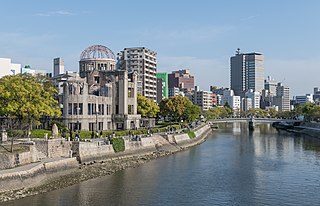
Hiroshima is the capital of Hiroshima Prefecture in Japan. As of June 1, 2019, the city had an estimated population of 1,199,391. The gross domestic product (GDP) in Greater Hiroshima, Hiroshima Urban Employment Area, was US$61.3 billion as of 2010. Kazumi Matsui has been the city's mayor since April 2011. The Hiroshima metropolitan area is the second largest urban area in the Chugoku Region of Japan, following the Okayama metropolitan area.
Nozomu Kasagi is a Japanese film director. He started creating independent films while he was a student at Sophia University in Tokyo. His early work was screened at various film festivals, including the Akiruno Film Festival, the Sotsuseisai, Kyoto International Student Film & Video Festival, the Tsutaya Indies Movie Festival, Planet Film Festival, and Mito Short Film Festival. In 2002, he made his debut as a film director with “Swan's Song,” which was based on SATO Sakichi’s screenplay. He has since been active in various genres, directing: TV drama series, such as “Ganso: Shonan-wara-yane Monogatari” [lit. The Original Shonan Tiled Roof Stories], starring TERAJIMA Susumu and TSUDA Kanji; music videos for artists such as HAYASHIBARA Megumi and Seikima-II; stage plays, such as his modern version of “A Streetcar Named Desire,” starring ASANO Tadanobu and AIKAWA Sho; and films, such as “Tokyo Real” based on the Shueisha Publishing Company's bestselling cell phone novel. In 2019, he directed the drama comedy film “Bullet Trip,” bringing home a Special Jury Award and Japan's first ever Best Foreign Language Film Award at the WorldFest-Houston International Film Festival.
Rainbow Reel Tokyo, until 2016 known as Tokyo International Lesbian & Gay Film Festival, also known by the acronym TILGFF, is an international film festival for LGBT audiences, held annually in Tokyo, the capital city of Japan.
Yasuko Tomita is a Japanese actress. She won the Award for Best Newcomer at the 6th Yokohama Film Festival and at the 8th Japan Academy Prize for Aiko 16 sai. She also won the award for best actress at the 9th Yokohama Film Festival for Bu Su. In 1995, she enjoyed career breakthrough as she won the Best Actress award at 1995 Tokyo International Film Festival for The Christ Of Nanjing.
Sankichi Tōge, born Mitsuyoshi Tōge, was a Japanese poet, activist, and survivor of the atomic bombing of Hiroshima. He is best known for his collection of poems Genbaku Shishu, published in 1951.
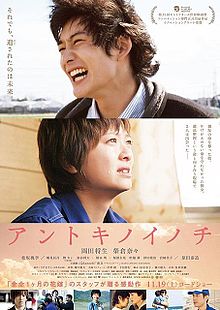
Life Back Then is a Japanese film from 2011 directed by Takahisa Zeze. It is based on the novel of the same name by Masashi Sada.
Shabondama is a 1922 Japanese nursery rhyme composed by Shinpei Nakayama with lyrics written by Ujō Noguchi. It is widely taught in Japanese nursery schools and kindergartens as a simple melody; it is also sometimes used in elementary school moral education courses, where students learn that it is a meditation on the death of a child.
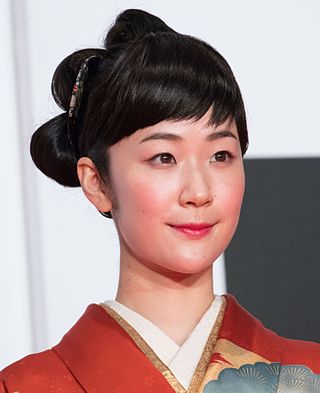
Haru Kuroki is a Japanese actress. She won the Silver Bear for Best Actress for her performance in the film The Little House.
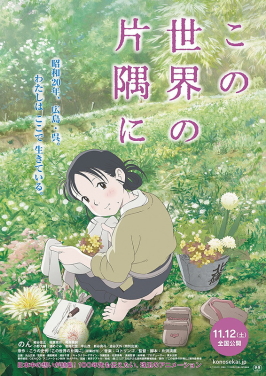
In This Corner of the World is a 2016 Japanese animated wartime drama film produced by MAPPA, co-written and directed by Sunao Katabuchi, featuring character designs by Hidenori Matsubara and music by Kotringo. The film is based on the manga of the same name written and illustrated by Fumiyo Kōno. It premiered in Japan on November 12, 2016. Animatsu Entertainment licensed the global distribution rights of the film in June 2016. Shout! Factory acquired the distribution rights for North America, with a U.S. theatrical release on August 11, 2017, co-released by Funimation Films. An extended version of the film, titled In This Corner of the World, premiered on December 20, 2019 and surpassed the extended 70mm cut of Final Yamato by five minutes to become one of the two longest theatrical animated films to date, tied with Chang'an.

Als die Sonne vom Himmel fiel is a 2015 Swiss documentary. Focusing on the atomic bombing of Hiroshima by the United States Army Air Force on 6 August 1945, it was filmed and produced at locations in the Hiroshima and in the Fukushima prefectures, Japan, and produced by the Japanese-Swiss film-maker Aya Domenig.
Aya Domenig is a film-maker and anthropologist of Japanese–Swiss origin.

Hirona Yamazaki is a Japanese actress who is represented by the talent agency Toho Entertainment.
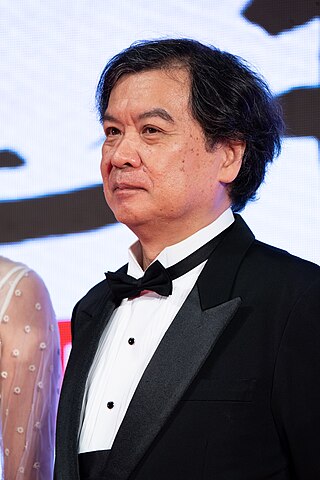
Sunao Katabuchi is a Japanese animation director, screenwriter, and storyboard artist. He is director of Contrail Co. Ltd. He has been a part-time lecturer at Nihon University College of Art since 2006, and a Project Professor at the college of Art of at the same university since 2018. He has also served as a part-time lecturer at the Graduate School of Tokyo University of the Arts since 2013. He is married to a fellow director of anime Chie Uratani.
The Charm of Others is a 2012 Japanese film release, directed by Ryutaro Ninomiya. The film was selected to play at a number of International Festivals, including the International Film Festival Rotterdam, the Subversive festival in 2019, and was featured at the PIA Film Festival in 2012, where it won the Semi-Grand Prix. The Charm of Others was Ninomiya's first film.

Ryusuke Hamaguchi is a Japanese film director and screenwriter. An alumnus of the University of Tokyo and the Tokyo National University of Fine Arts and Music, he started gaining attention in his home country with the graduate film Passion (2008).
Hirobumi Watanabe is a Japanese film director and actor. He writes the scripts for and performs as an actor in his films, while also sometimes acting in the films of other directors.

Food Luck is a 2020 Japanese drama film written and directed by Jimon Terakado of the comedy trio Dachou Club. The plot centers on Yoshito Sato, a freelance writer who was born into a family that ran a popular yakiniku restaurant and now embarks on a food journey to find the flavors of home, with young reporter Shizuka Takenaka. It stars Naoto and Tao Tsuchiya, with Ken Ishiguro, Satoru Matsuo, Yasufumi Terawaki, Hakuryu and Ryo in supporting roles. Some scenes were shot in several actual yakiniku restaurants around Japan that Terakado Jimon loved and recommended as a gourmet.
Hikaru Fujii is a contemporary Japanese artist who explores the relationship between art, history, and social activism. Primarily working in documentary film and multi-channel video installation, Fujii employs archival research, fieldwork, interviews, and workshops to create artworks to examine the relationships between historical narrative and education, structural violence, crisis, race, and power. Of particular interest for him are the role and responsibility of museums and institutions as sites that preserve and perpetuate specific historical narratives. After the 2011 Great East Japan Earthquake and nuclear disaster, Fujii has actively documented the disaster and raised awareness around the world about the situation in Japan.
Masakazu Kaneko is a Japanese film director.
Michihito Fujii is a Japanese film director, screenwriter, and filmmaker, and belongs to Babel Label Co. Born in Shibuya-ku, Tokyo, he graduated from Nihon University College of Art, Department of Film and New Media, Screenwriting Course. Since August 2024, his management services have been handled by the entertainment agency Meteora Inc.
References
- 1 2 Frater, Patrick (15 January 2019). "Damah Multi-Faith Film Festival Shifts to Tokyo". Variety. Retrieved 25 June 2024.
- 1 2 "ABOUT". Damah. 27 February 2023. Retrieved 25 June 2024.
- 1 2 3 4 5 6 7 8 "What is the Hiroshima International Film Festival (HIFF)? (1)~ History of the film festival ~". HIFF (in Japanese). 25 November 2018. Retrieved 25 June 2024.
- ↑ "Hiroshima International Film Festival". Get Hiroshima. 21 November 2019. Retrieved 25 June 2024.
- ↑ "Home". 広島国際映画祭 (Hiroshima International Film Festival) (in Japanese). 1 September 2014. Retrieved 25 June 2024.
- 1 2 3 "About Hiroshima International Film Festival". 広島国際映画祭 (Hiroshima International Film Festival) (in Japanese). 1 September 2014. Retrieved 25 June 2024.
- 1 2 3 "Hiroshima filmfest to open with Michihito Fujii's 'Village'". The Asahi Shimbun. 22 November 2023. Retrieved 25 June 2024.
- ↑ Joseph, Mark (11 December 2009). "Damah Film Festival Opens In Hiroshima". HuffPost. Retrieved 25 June 2024.
- ↑ Tanaka, Michiko (30 November 2015). "Documentary film on Hiroshima and Fukushima to be screened at Hiroshima International Film Festival". 中国新聞ヒロシマ平和メディアセンター. Retrieved 25 June 2024.
- ↑ "Hiroshima International Film Festival". Eidgenössisches Departement für auswärtige Angelegenheiten EDA (in Italian). Retrieved 25 June 2024.
- ↑ "ヴィレッジ". eiga.com.